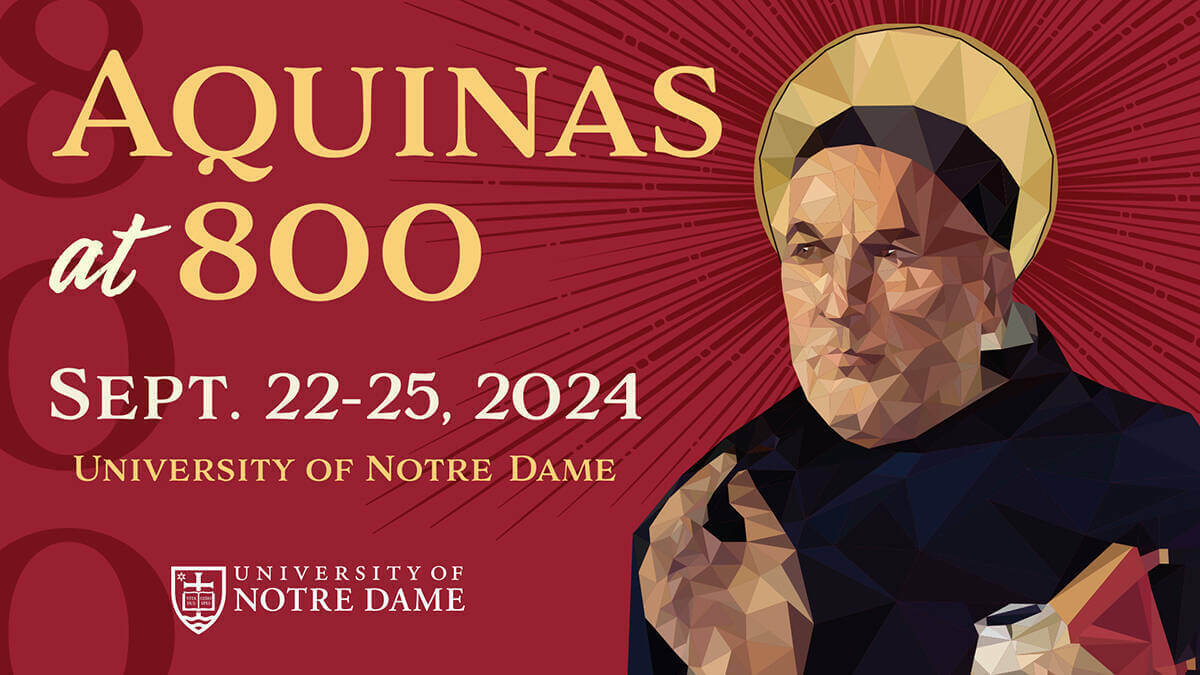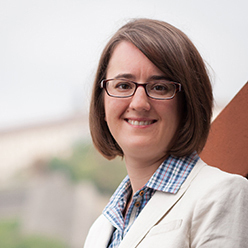Notre Dame to host conference on St. Thomas Aquinas, commemorating 800th anniversary of his birth

For centuries, the work of St. Thomas Aquinas has informed academic inquiry into issues of human dignity, freedom, economic development, work, poverty, the environment and other matters of global significance.
To commemorate the 800th anniversary of his birth, the University of Notre Dame will host a conference Sunday through Wednesday (Sept. 22-25) celebrating Aquinas’ enduring importance to contemporary cultural, philosophical and theological discussions.
“Aquinas at 800: ‘Ad multos annos’” will be the largest conference of its kind, with more than 500 in-person attendees and more than 150 speakers.
Those interested in participating may also register to attend via Zoom.

The event offers people who may have preconceived notions about Aquinas a chance to take another look, said Therese Cory, the John and Jean Oesterle Associate Professor of Thomistic Studies, the director of the Jacques Maritain Center and one of the event’s organizers.
“If they thought he wasn’t relevant anymore, this conference might offer them reason to think, ‘Wow, his thought is still flourishing and able to help us think through the problems that we have today,’” Cory said. “They’ll have a chance to see how wide and expansive his work really is.”
The conference will begin at 4 p.m. Sunday with an opening Mass at the University’s Basilica of the Sacred Heart. Rev. Kevin Grove, C.S.C., an associate professor of theology, will serve as celebrant.
Three esteemed faculty members from the Pontifical University of Saint Thomas Aquinas in Rome will present at the conference. Rev. Serge-Thomas Bonino, O.P., the dean of the faculty of philosophy and president of the Pontifical Academy of Saint Thomas Aquinas, and Rev. Thomas Joseph White, O.P., the university’s rector magnificus, will each offer a keynote address. Fr. Wojciech Giertych, O.P., a theologian of the Papal Household and professor of moral theology, will offer opening remarks.
A concluding Mass will be held at 5:15 p.m. Wednesday in the Basilica.
One of Aquinas’ most enduring and important contributions is his ability to bring together concepts that often appear to be in conflict, Cory said, such as faith and reason or human embodiment as flesh-and-blood creatures and human transcendence in communion with God.
“Holding those two dimensions at the same time has always been a challenge for philosophers, and for Aquinas, it informs everything he has to say about who we are as human beings,” Cory said. “I think that’s a crucial lesson for us today, because in our society we have a tendency to emphasize materialistic pleasures and consumerism at the expense of our more transcendent, spiritual needs. At the same time, we are in danger of over-abstractifying our lives as humans — communicating through screens and phones, living in an abstract space in our minds — and forgetting that we are embodied creatures.”
Likewise, Aquinas saw science and religion not as separate realms, but as deeply connected, Cory said. “Our scientific endeavors and our thinking about God have to be able to come together into a single space where we’re able to think and reason and talk with other people about what we’re learning and learn from them as well. Aquinas provides us with a model for a harmonious relationship between faith and reason.”
As a Catholic research institution, Notre Dame takes all branches of knowledge seriously — faith and reason, theology and philosophy, and religion and science — making the University an ideal choice to host this flagship event, Cory said.
“Notre Dame is also one of the best places in the world to do medieval philosophy research,” she said. “We have an incredibly strong community in philosophy and theology who work on medieval figures, and particularly on the thought of Aquinas. So, it made sense for us to take the lead in organizing this. We are thrilled to host what will be the largest gathering of scholars celebrating Aquinas during this anniversary year.
“And for our Notre Dame students, the conference allows them to see the sheer number of people who are working on Aquinas and the variety of disciplines, locations and institutions they represent. It lets students see that when they’re studying Aquinas, it’s not just an item on a syllabus — they’re part of this community, too.”
Latest Faith
- Undersecretary of the Dicastery for Promoting Integral Human Development to deliver Keeley Vatican LectureRev. Msgr. Anthony Onyemuche Ekpo, undersecretary of the Vatican's Dicastery for Promoting Integral Human Development, will deliver the Keeley Vatican Lecture on Monday (Feb. 10) at 5 p.m. at the University of Notre Dame.
- Nearly 500 students, faculty and staff to attend 2025 March for Life in Washington, D.C.On January 24, nearly 500 undergraduate and graduate students, faculty and staff from the University of Notre Dame, Holy Cross College and St. Mary’s College will participate in the 2025 March for Life in Washington, D.C., now in its 52nd year.
- Merry Christmas from Notre DameMay we be the seekers of truth, the sustainers of hope, and the builders of bridges that our world needs. – Rev. Robert A. Dowd, C.S.C., University President
- University of Notre Dame receives $10 million grant to strengthen faith-based service opportunities for youth and young adultsThe University of Notre Dame has received a $10 million grant from Lilly Endowment to fund the new Pathways to Communion Program at the McGrath Institute for Church Life. This program aims to strengthen the ecosystem of theologically informed service opportunities for young Catholics in the United States.
- What was the Christmas Star?It’s a story so familiar to many that you may not even realize there’s more to be discovered. The Bible describes an event that led so-called wise men to Jesus. Scripture calls it a star, but what was it really? That’s the question Grant Mathews, director of the Center for Astrophysics at Notre…
- Con todo el corazón (With all our heart)Coro Primavera celebrates Latino community on campus Enter the Basilica of the Sacred Heart during the 3:30 Sunday Mass, and you’ll hear a choir singing the tunes of the same church songs you remember—except the lyrics are in Spanish. Or you may hear some different melodies that bring new…










